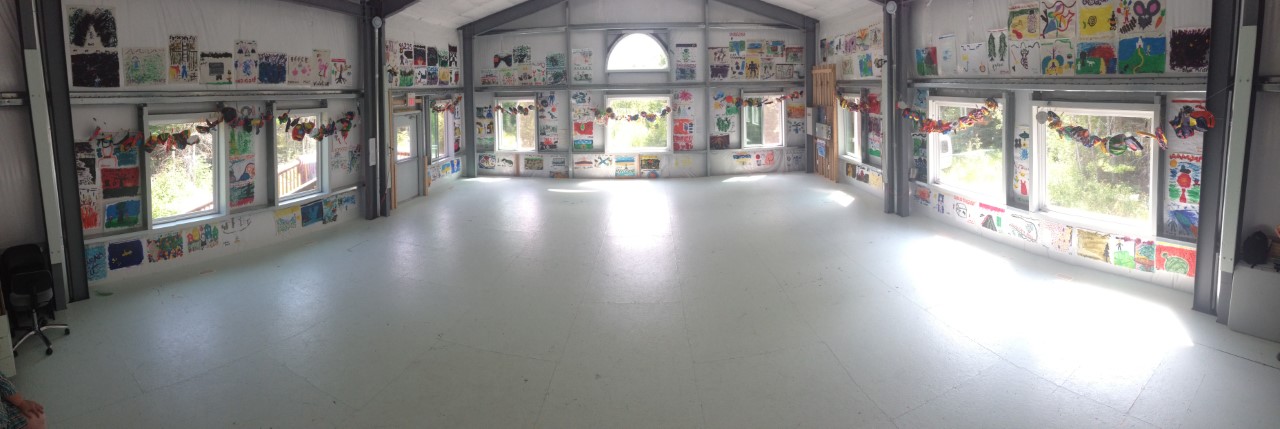Canadian Theatre Encyclopedia
Manitoulin Conservatory for Creation and Performance

Training institution and theatre creation centre on Manitoulin Island, Ontario. Established as “The Clown Farm” in 2002, the name was changed to the Manitoulin Conservatory for Creation and Performance (MCCP) in 2012 as the organization transitioned into non-profit status. It became a registered charity the following year. The Clown Farm began informally with John Turner hosting students on the land he and his wife Julia Winder had purchased after moving out of downtown Toronto. The two ran the MCCP for the duration of its existence with Turner serving as Artistic Director and Winder providing leadership in a variety of administrative, artistic, and visioning roles. From those humble beginnings, the MCCP became a major centre for the development and teaching of the clowning techniques developed by Richard Pochinko. A foundational goal was to become a “living archive” (“Our Vision”) of this uniquely Canadian approach to clown performance.
Situated in an extremely rural part of the island, the MCCP philosophy embraced the pastoral setting. Much of the training took place in the old barn on the property -- and in later years a custom-built studio -- but many classes were also held outdoors in the woods, fields, swamps, and on the beaches of Manitoulin Island. Students frequently lived in tents for the duration of their training. Living arrangements were communal, including shared outdoor cooking facilities. The unique setting and distinctive methodology of the MCCP attracted students from all over the world.
Turner taught many of the courses, especially the foundational Mask and Clown Intensive (often called Baby Clown because it ended with the birth of the students’ clowns). Other MCCP faculty included major teachers in the Pochinko tradition including Turner’s Mump and Smoot partner Michael Kennard and their director Karen Hines, creator of the Poschy Plays. Its faculty also included artists who expanded the training beyond the Pochinko tradition to include dance, vocal work, set and prop construction, and somatic exploration -- all with a focus on how these practices intersected with clowning and performance creation.
Throughout its existence, the MCCP received no project or operational funding from any level of government or arts funding organization. The conservatory supported itself, paid its teachers, maintained its scholarship fund, and operated its artist-in-residence program solely via donations and course fees -- often offered via flexible payment plans.
The MCCP enjoyed a long-standing relationship with the De-ba-jeh-mu-jig Theatre, based on the Wikwemikong Unceded Indian Reserve of Manitoulin Island. De-ba-jeh-mu-jig artists would train at the MCCP and use the methodology to support their creative work centering Anishinaabeg culture, story, and worldview.
The MCCP ceased operations in 2020.
Since 2022, the unofficial successor to the MCCP has been One North Clown and Creation which runs programming both on Manitoulin Island and in Sudbury, Ontario. Founded by Jenny Hazelton who spent years working in various capacities at the MCCP, One North offers many of the same courses as the former MCCP and engages many of the same teachers, including, frequently, Turner himself.
Sources
“About the Company.” Debajehmujig Theatre Group, http://www.debaj.ca/?q=content/about-company. Accessed 8 Jan. 2021.
“Accommodation.” The Manitoulin Conservatory for Creation and Performance, https://www.manitoulinconservatory.com/accommodation/. Accessed 28 Dec. 2020.
Berti, Joahnna with Bruce Naowegijig. “The Impact of Pochinko-Based Clown Theatre at Debajehmujig Storytellers.” Canadian Theatre Review, No. 183, Summer 2020, pp. 34-38.
“Course Descriptions 2020.” The Manitoulin Conservatory for Creation and Performance, https://www.manitoulinconservatory.com/course-descriptions-1/. Accessed 8 Jan. 2021.
Dobi, Shoni. “Love and Magic at the Clown Farm with John Turner.” The Hospital Clown Newsletter, vol. 10, no. 1, 2005, https://www.hospitalclown.com/archives/vol-10/vol-10-1and2/vol10-1_clown-farm.pdf. Accessed 30 Dec. 2020.
Manitoulin Conservatory for Creation and Performance. “Fake news and real clowns, support The MCCP.” Received by Charlie Peters, 10 Apr. 2018.
“Our Vision.” The Manitoulin Conservatory for Creation and Performance, https://www.manitoulinconservatory.com/vision/. Accessed 28 Dec. 2020.
“Scholarships.” The Manitoulin Conservatory for Creation and Performance, https://www.manitoulinconservatory.com/course-information/scholarships/. Accessed 8 Jan. 2021.
The Clown Farm. DEAR WORLD! Facebook, 29 Sep. 2020, https://www.facebook.com/ManitoulinClownFarm. Accessed 8 Jan. 2021.
Turner, John. “MCCP Article.” Received by Charlie Peters, 12 Jan. 2021.
“Welcome to the MCCP.” The Manitoulin Conservatory for Creation and Performance, https://www.manitoulinconservatory.com/. Accessed 28 Dec. 2020.
Profile by Charlie Peters, University of Alberta.
Last updated 2025-04-16

